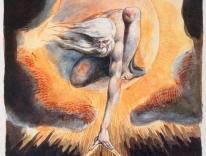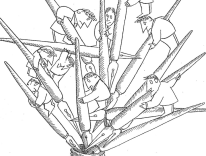Terrence Malicks The Tree of Life is one of the most polarizing films in recent memory. In his review in the New York Times, A. O. Scott immediately placed the film within the pantheon of great American art, comparing it to Melvilles Moby Dick and Whitmans Leaves of Grass. At the opposite end of the spectrum, there have been numerous reports of moviegoers walking out midway through the enigmatic film and angrily demanding their money back. (Its safe to say that The Tree of Life is the anti-summer blockbuster.) The Tree of Life has been praised as visionary, criticized as self-indulgent, even lauded for its visionary self-indulgence.Regardless of whether one thinks The Tree of Life a masterpiece or a monstrosity, it is undeniable that Malicks films, from Badlands (1973) onward, have forced us to rethink what film can and should be. Every Malick film has its own joys and perplexities. The New World (2005) remains my personal favoriteupon finishing the gorgeous retelling of the Pocahontas story for the first time, I immediately started watching the 150-minute movie over again. But the movie that has haunted me the most is Malicks Days of Heaven (1978).Days of Heaven centers around three figures: a drifter named Bill (played by a young Richard Gere), his girlfriend Abby (Brooke Adams), and a farmer (known only as the farmer and played by Sam Shephard). In the movie's first scene, Bill, working at a steel mill, fights with and accidentally kills his boss. Panicked, he hops on a train and flees Chicago, taking with him Abby and his younger sister, Linda, who plays only a minor plot role but narrates throughout. When they arrive in the Texas panhandle, Bill and Abby find work as seasonal laborers on a large wheat farm owned by Shephard's character.Bill and Abby tell others, including their new employer, that they are brother and sister. In a move typical of Malicks elliptical style, were never explicitly told why they tell this lie, though we suspect it is because they live together while unmarried. (Lindas explanation: You know how people are. You tell em somethin, they start talkin.) When Bill finds out that the wealthy farmer is dying (of what, were never told) and that he is attracted to Abby, he encourages his girlfriend to accept these advances; that way, when the farmer dies, Bill and Abby will be able to leave behind their lives of wandering and backbreaking labor. Needless to say, complications arise, leading to a catastrophe of Biblical proportions, complete with locusts, apocalyptic fires, and more murders.But Days of Heaven isnt a work of melodrama. In melodrama, violent action is the result of violent emotion, which we are given direct access to. In Days of Heaven, emotion is hinted at but rarely expressed. We are often left in the position of the young Linda, bewildered at the actions of characters we can never really know. So much remains concealedthe farmers name and his illness, Bills motivation for almost everything he does, Abby's true feelings towards the farmerthat the film seems more a work of myth than of realism. Or, rather, it combines a mythic impulse with a rigorous commitment to realism (the camera zooms in on the locusts so closely that we for a moment feel as if weve been transplanted into a National Geographic film). Days of Heaven is one of the most sublimely shot films of all time, offering sweeping images of landscape, patient shots of men and women at work on the farm, even fleeting glimpses of the rabbits and wild birds that are killed as the threshing machine advances through the fields.But, strange to say about a film so celebrated for its visual power, what stuck with me most was Lindas narration. The girls words are often only tangentially related to the action on screen; they dont explain the films plot or characters but add complexity to them. I cant do justice to Linda's wonderful wedding of slang and poetry, simplicity of diction and complexity of imagery, but here is a taste:Lindas haunting description of the RaptureBut if youve been bad, God dont even hear ya, he dont even hear ya talkinhas stayed with me. In its elliptical style and oblique narration, Days of Heaven refuses to give us many of the things we expect from a film. But what it does offer is something arguably more valuable: a reminder of films ability to challenge, provoke, frustrate, and ultimately astound us.


